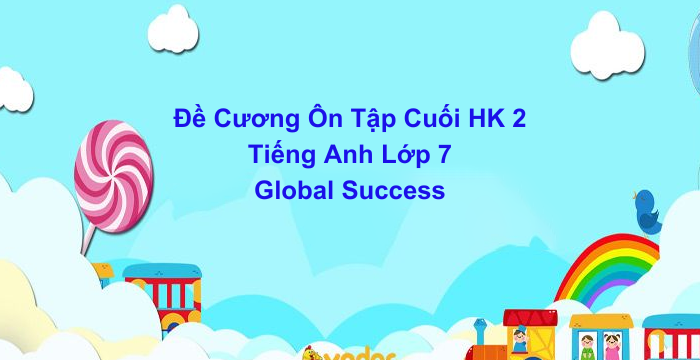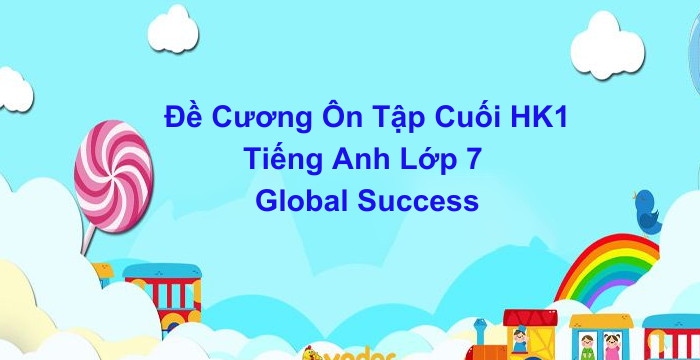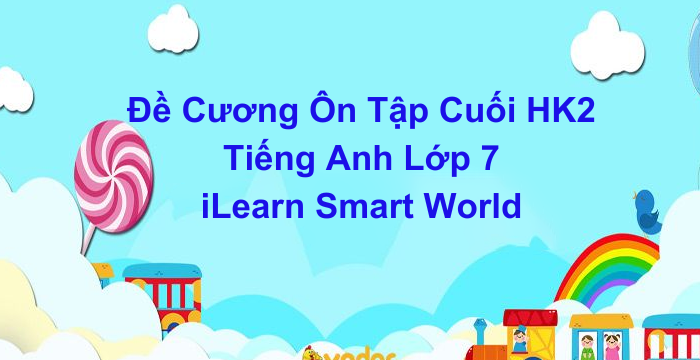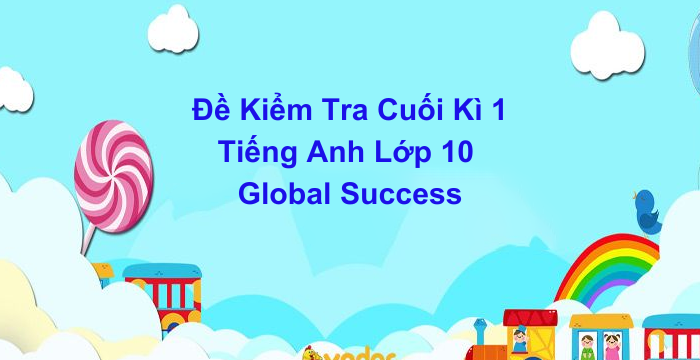Đề Cương Ôn Tập Cuối Học Kì 2 Tiếng Anh Lớp 7 Global Success (18.04.2025)
Thầy Thắng
ĐỀ CƯƠNG LỚP 7
15
Ngày đăng: 18-04-2025 09:56:15

ĐỀ CƯƠNG ÔN TẬP HỌC KÌ II
Trường THCS Đỗ Đăng Tuyển, TP Đà Nẵng, 2024 - 2025
I. Choose the word (A, B, C, D) whose main stress is placed differently from that of the others.
1. A. energy B. dioxide C. dangerous
2. A. polluting B. recycle C. easily
3. A. resources B. government C. expensive
4. A. dangerous B. energy C. recycle
II. Choose the word (A, B, C, D) whose underlined part is pronounced differently from the others.
1. A. plane B. narrow C. station
2. A. traffic B. station C. safety
3. A. train B. traffic C. plane
4. A. safely B. fly C. cycle
III. Choose one word which does not belong to each group.
1. A. frightening B. violent C. funny
2. A. fantastic B. holiday C. wonderful
3. A. gripping B. boring C. interesting
4. A. amazing B. island C. landscape
IV. Choose the best answer A, B, C, or D to complete the sentences.
1. People ___ not choose to have their holiday on other planets because it will be very expensive.
A. might B. won’t C. should
2. Fumeless cars ___ pollute the environment like the cars we have now do.
A. will B. won’t C. might
3. Because vehicles using petrol cause pollution, scientists want to find a cheaper and ___ replacement.
A. dangerous B. polluted C. eco-friendly
4. Because Thomas is late for the bus, so he will ___ a taxi to go to the train station.
A. take B. ride C. stop
5. Wind is a renewable source of energy, because it is ___.
A. limited B. unlimited C. run out
6. ___ Henry have a TV in his room? – No, he ___.
A. Does – he does B. Is – he isn’t C. Does - he doesn’t
7. My English teacher, Mr. Nam, often drives his car ___ on the way to school.
A. careful B. caring C. carefully
8. This hoverboard belongs to me. That one is ___.
A. hers B. her C. she
9. ___ you go to school yesterday? – I rode my bicycle.
A. Did B. Do C. Does
10. My dad is ___ on foot to work.
A. goes B. go C. going
11. ___ that documentary is boring, I still love the main character in it.
A. Although B. Because C. However
12. ___ car is so dirty. I can’t even tell what color it is.
A. Your B. Yours C. Hers
13. ___ is one of special festivals for children in most Asian countries.
A. Tulip Festival B. Halloween C. Mid-Autumn Festival
14. Nam and Ba ___ ice cream at the moment.
A. is eating B. was eating C. are eating
15. The film was so ___ that we almost fell asleep.
A. interesting B. gripping C. boring
16. My father always ___ fishing but he rarely catches any fish.
A. is going B. go C. goes
17. ___ is a system of tubes. You can go from one place to another in just minutes.
A. Hyperloop B. Teleporter C. Flying car.
18. ___ People ___ nuclear energy as in the past.
A. will use B. are/using C. did/use
19. Mark: "How was the movie yesterday?" Joe: "___"
A. It's a big disappointment. B. Yes, I know. C. We will use it in the future.
20. Jenny: "Do you think we will travel to other planets for holidays in the future?" Henry: "___"
A. Sounds great! I hope we will be soon
B. No. It probably won't
C. Yes. It probably will
21. You just stand on a solowheel then turn ___ the switch and drive away.
A. in B. on C. at
22. Nuclear power is not only polluting but also ___ to our environment.
A. danger B. endanger C. dangerous
23. Nick: "Do you think we will travel to other planets for holidays in the future?" Tom: "___"
A. It probably won't. B. No, we didn't. C. Yes, it does.
24. Wind is one type of ___ source of energy.
A. renewable B. expensive C. dangerous
25. Using non-renewable energy sources like coal, oil ___ a lot of carbon dioxide.
A. makes B. produces C. uses
26. Have you got ___ pen, or would you like to borrow ___?
A. your – mine B. yours – my C. yours – mine
27. I lost my pencil. Can I have one of ___?
A. your B. you C. yours
28. Solar-powered ships are eco-friendly. They will not cause ___.
A. pollute B. pollution C. polluted
29. Bullet train is fast, green, and ___.
A. unsafe B. fast C. safe
30. People will develop renewable energies ___ reduce nature destruction.
A. to B. for C. at
V. Write the correct form of the words in brackets.
1. Non-renewable energy is __________ and it is harmful to the environment. (limit)
2. Using public transport can reduce __________. (pollute)
3. A __________ story often makes us laugh. (fun)
4. The news was __________. I couldn't believe it. (shock)
VI. Use the correct tense and form of each verb in brackets to complete the sentence.
1. At present, my sister (ride) __________ a bike to school.
2. Nowadays, the government (build) __________ stations for bullet trains.
3. In the future, we (travel) __________ much further than we do now.
4. I hope that all means of transport (run) __________ on electricity.
C. READING:
I. Read the following passage and complete it with the correct words from the box.
celebrate – to – west – very – whales
Every year, about 20,000 grey whales swim past the (1) __________ coast of Vancouver Island. The whales travel from Mexico to the Arctic and back again. The whole trip is about 16,000 kilometres. Every March, the people who live around the Pacific Rim National Park have a festival to (2) __________ the whales’ journey. The festival is the Pacific Rim Whale Festival. The whales travel (3) __________ close to the shore as they swim north. This allows people (4) __________ gather together to watch the whales from land and from boats.
II. Read the passage and choose the correct answer for each question.
Benefits Of Renewable Energy
There are a lot of benefits to using renewable energy. First, naturally replenished energy resources are found over wide geographical areas, in contrast to non-renewable resources, which exist only in a limited number of countries. In addition to that, rapid deployment of renewable energy and energy efficiency is resulting in significant energy security, climate change mitigation, and climate change mitigation. There are other undeniable advantages of renewable energy. Renewable technologies are also suited to rural and remote areas and developing countries, where energy is often crucial in human development.
Renewable energy systems are rapidly becoming more efficient and cheaper. Their share of total energy consumption is increasing. Growth in consumption of coal and oil could end by 2020 due to increased uptake of renewables and natural gas.
1. What kinds of energy exist only in a limited number of countries?
A. non-renewable resources
B. replenished energy resources
C. renewable energy
2. Which of the following is NOT mentioned as the result of rapid deployment of renewable energy and energy efficiency?
A. climate change mitigation
B. climate change mitigation
C. insignificant energy security
3. The word "uptake" is closest in meaning with:
A. consumption B. replacement C. development
4. Where is energy often crucial in human development?
A. remote areas B. urban areas C. underdeveloped countries
D. WRITING:
I. Find out the mistake and correct in each following sentence.
1. Can I have a pen? I can't find yours.
2. My sister and I are different. My hair is short and her is long.
3. This is hers car. That car is his.
4. Mine scooter is red. Hers is blue
5. Her car can carry four passengers. Our can carry seven passengers.
6. Their car runs on petrol. My runs on solar energy.
II. Change these sentences into Yes/No questions.
1. I can cook many traditional foods.
→ _____________________________
2. My family always gathers together at Tet.
→ _____________________________
3. He is interested in playing football.
→ _____________________________
4. Lan saw this movie yesterday.
→ _____________________________
5. People will use hyperloop in the future.
→ _____________________________
6. We should use low-energy light bulbs in our homes to save energy.
→ _____________________________
III. Combine each pair of sentences below using the word in the bracket to complete the sentence.
1. Cinema tickets are expensive. However, people still buy them. (Although)
→ _____________________________
2. The film received good reviews. Only a few people saw it. (However)
→ _____________________________
3. Mai studied hard for the exam, but she failed it. (Although)
→ _____________________________
4. I was tired. I still tried to finish all my homework. (However)
→ _____________________________
5. Tom overslept this morning. He went to bed early last night. (Although)
→ _____________________________
6. The story of the film is silly, but many people still enjoyed it. (However)
→ _____________________________
IV. Rearrange the words/phrases to make a complete sentence.
1. You / put / the rubbish / should / in / waste bin / the / over there.
→ _____________________________
2. The students / ride / too / their / bikes / shouldn't / fast.
→ _____________________________
3. shouldn't / You / for / you / bad / many / cookies. / They / eat.
→ _____________________________
4. The students / in / a line / should / stand / to / the / school bus / get on.
→ _____________________________
5. My / to / by / goes / car / protect / work / bus / mother / the / environment / to.
→ _____________________________
6. The / is / teacher / how / energy / works / solar / explaining.
→ _____________________________
V. Use Should/Shouldn't to rewrite the sentence.
1. It's very bad for you to stay up late.
→ _____________________________
2. It's a good idea to turn off the electrical appliances when going out.
→ _____________________________
3. It's not a good idea to overcool the classroom.
→ _____________________________
4. It's a good idea to check that none of your taps around the school are dripping.
→ _____________________________
5. It's not good for your son to watch TV so much.
→ _____________________________
6. It's a good idea to go to school on foot.
→ _____________________________
VI. Complete the second sentences so that it means the same as the sentence before.
1. This is their car.
→ This car __________________________
2. My bike is black.
→ The black bike ____________________
3. These are his pens.
→ These pens ______________________
4. That is her bag.
→ That bag ___________________________
5. Those are our pictures.
→ Those pictures ________________
6. We do not own this flying car.
→ This flying car is _________
VII. Write sentences by using the suggestions.
1. The students /talk/ how/ save/ energy/ now.
→ _____________________________
2. Nowadays,/ people/ not/ use/ energy from coal.
→ _____________________________
3. She/ think/ there/ be/ driverless car/ future.
→ _____________________________
4. Solar energy/ hydro energy/ renewable/ sources.
→ _____________________________
5. At present/ my/ city/ build/ stations/ skyTrans.
→ _____________________________
6. Solar-powered ship/ be/ popular/ future.
→ _____________________________
PART II.
I. Write an email (60-80 words) to tell a friend about the festival.
You should use the following cues:
- What festival you tell
- What activities there are
- when people celebrate it
- Why you like it.
II. Write a paragraph (60-80 words) about how people in your family save energy.
You should use the following cues:
- What kinds of energy your family use
- Tell good points about saving these kinds of energy.
- What energy sources you think people should use in the future and tell the reasons.
The end
Giải đáp mọi thắc mắc trong đề vui lòng liên hệ Zalo: 034 8371 758
Theo dõi fanpage để cập nhật nhanh các bài tập và đề kiểm tra mới nhất.
https://www.facebook.com/profile.php?id=61555984765050
Bài Viết Liên Quan

Đề Cương Ôn Tập Cuối HK1 Tiếng Anh Lớp 7 Global Success (11.12.2025)

Đề Cương Ôn Tập Cuối HK1 Tiếng Anh Lớp 7 Global Success (11.12.2025)

Đề Cương Ôn Tập Cuối HK1 Tiếng Anh Lớp 7 Global Success (11.12.2025)

Đề Cương Ôn Tập Cuối HK1 Tiếng Anh Lớp 7 Global Success (10.12.2025)

Đề Cương Ôn Tập Cuối HK1 Tiếng Anh Lớp 7 Global Success (4.12.2025)

Đề Cương Ôn Tập Giữa Học Kì 1 Tiếng Anh Lớp 7 Global Success (29.10.2025)

Đề Cương Ôn Tập Giữa Học Kì 1 Tiếng Anh Lớp 7 Global Success (28.10.2025)

Đề Cương Ôn Tập Giữa Học Kì 1 Tiếng Anh Lớp 7 Global Success (23.10.2025)

Đề Cương Ôn Tập Giữa Học Kì 1 Tiếng Anh Lớp 7 Global Success (21.10.2025)

Đề Cương Ôn Tập Giữa Học Kì 1 Tiếng Anh Lớp 7 Global Success (17.10.2025)

Đề Cương Ôn Tập Cuối Học Kì 2 Tiếng Anh Lớp 7 Global Success (15.05.2025)

Đề Cương Ôn Tập Cuối Học Kì 2 Tiếng Anh Lớp 7 Global Success (24.04.2025)

Đề Cương Ôn Tập Cuối Học Kì 2 Tiếng Anh Lớp 7 Global Success (17.04.2025)

Đề Cương Ôn Tập Cuối Học Kì 2 Tiếng Anh Lớp 7 Global Success (17.04.2025)

Đề Cương Ôn Tập Cuối Học Kì 1 Tiếng Anh Lớp 7 Global Success (15.12.2024)

Đề Cương Ôn Tập Cuối Học Kì 1 Tiếng Anh Lớp 7 Global Success (15.12.2024)

Đề Cương Ôn Tập Cuối HK1 Tiếng Anh Lớp 7 Global Success (10.12.2024)

Đề Cương Ôn Tập Giữa Học Kì 1 Tiếng Anh Lớp 7 Global Success (29.10.2024)

Đề Cương Ôn Tập Giữa Học Kì 1 Tiếng Anh Lớp 7 Global Success (23.10.2024)

Đề Cương Ôn Tập Giữa Học Kì 1 Tiếng Anh Lớp 7 Global Success (22.10.2024)

Đề Cương Ôn Tập Cuối HK1 Tiếng Anh Lớp 7 Global Success (05.06.2024)

Đề Cương Ôn Tập Cuối HK1 Tiếng Anh Lớp 7 Global Success (05.06.2024)

Đề Cương Ôn Tập Cuối HK1 Tiếng Anh Lớp 7 Global Success (05.06.2024)

Đề Cương Ôn Tập Cuối HK1 Tiếng Anh Lớp 7 Global Success (05.06.2024)

Đề Cương Ôn Tập Giữa Học Kì 1 Tiếng Anh Lớp 7 Global Success (31.05.2024)

Đề Cương Ôn Tập Giữa Học Kì 1 Tiếng Anh Lớp 7 Global Success (31.05.2024)

Đề Cương Ôn Tập Giữa Học Kì 1 Tiếng Anh Lớp 7 Global Success (31.05.2024)

Đề Cương Ôn Tập Cuối HK2 Tiếng Anh Lớp 7 Global Success (23.04.2024)

Đề Cương Ôn Tập Cuối HK2 Tiếng Anh Lớp 7 Global Success (22.04.2024)

Đề Cương Ôn Tập Cuối HK2 Tiếng Anh Lớp 7 Global Success (21.04.2024)

Đề Cương Ôn Tập Cuối HK2 Tiếng Anh Lớp 7 iLearn Smart World (20.04.2024)

Đề Cương Ôn Tập Cuối HK2 Tiếng Anh Lớp 7 Global Success (13.04.2024)

Đề Cương Ôn Tập Cuối HK2 Tiếng Anh Lớp 7 Global Success (10.04.2024)

Đề Cương Ôn Tập Cuối HK2 Tiếng Anh Lớp 7 Global Success (07.04.2024)

Đề Cương Ôn Tập Giữa HK2 Tiếng Anh Lớp 7 Global Success (22.03.2024)

Đề Cương Ôn Tập Giữa HK2 Tiếng Anh Lớp 7 Global Success 11.03.2024

Đề Cương Ôn Tập Giữa HK2 Tiếng Anh Lớp 7 Global Success 10.03.2024

Đề Cương Ôn Tập Giữa HK2 Tiếng Anh Lớp 7 Global Success 09.03.2024

Đề Cương Ôn Tập Giữa HK2 Tiếng Anh Lớp 7 Global Success 08.03.2024

Đề Cương Ôn Tập Giữa HK2 Tiếng Anh Lớp 7 Global Success 06.03.2024

Đề Cương Ôn Tập Giữa HK2 Tiếng Anh Lớp 7 Global Success 24.02.2024

Bài Đăng Gần Đây

Đề Kiểm Tra Giữa Kì 2 Tiếng Anh Lớp 7 Global Success (3.2.2026)

Đề Kiểm Tra Cuối Kì 1 Tiếng Anh Lớp 10 Global Success (02.01.2026)

Đề Cương Ôn Tập Cuối Học Kì 1 Tiếng Anh Lớp 8 Global Success (30.12.2025)

Đề Kiểm Tra Cuối Kì 1 Tiếng Anh Lớp 6 Global Success (30.12.2025)

